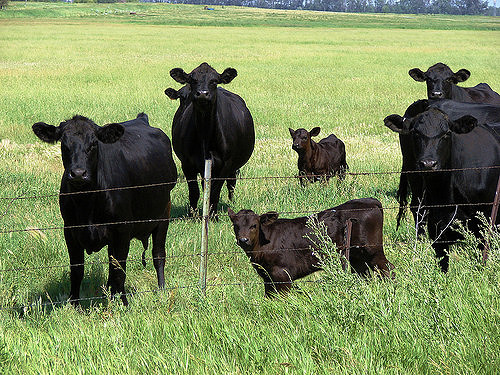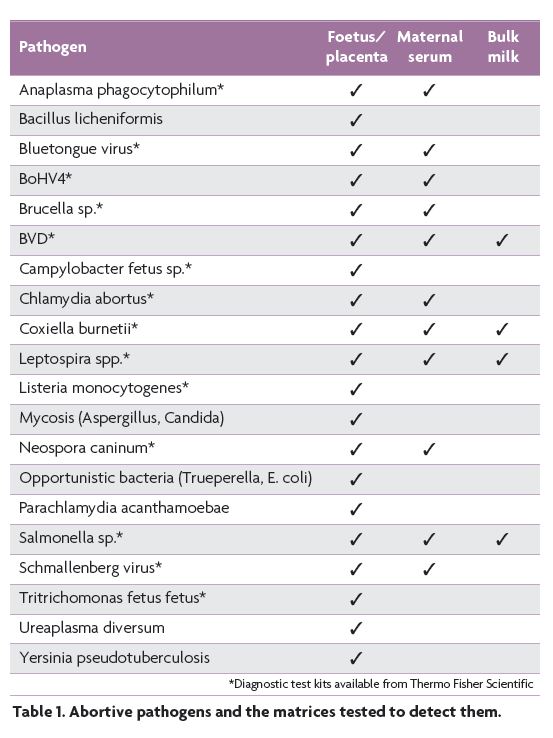



Ruminant Abortion Requires Diagnostics to Fight Disease
Repeated abortions in a herd can have a severe economic impact on farming operations, writes Laurent Delooz, Regional Association for Animal Health and Identification (ARSIA) based in Belgium.NOTE: This article first appeared in International Dairy Topics.
 Industry experts estimate that the cost associated with abortions typically range between €500-1,000. Such incidences can lead to decreased milk production and decreased number of herd replacements, while also increasing costs associated with feed, medical treatment, and artificial insemination.
Industry experts estimate that the cost associated with abortions typically range between €500-1,000. Such incidences can lead to decreased milk production and decreased number of herd replacements, while also increasing costs associated with feed, medical treatment, and artificial insemination.
A wide range of pathogens – some with zoonotic potential – may be the cause. Accurate identification of the abortive agent is key to establishing a successful treatment program. However, the large number of potential infectious agents makes fast and accurate diagnosis a challenge. Abortion is a very unspecific sign, so it is very difficult to know for which cause we have to perform an analysis.
We systematically use a panel of diagnostic tests for the 15 most frequently occurring abortive pathogens to screen the samples (Table 1). Without diagnostic testing, it is impossible to find the aetiology and fight the disease.
A success story on this front can be found in Belgium, where government and industry officials worked together to establish a comprehensive program to proactively monitor causes for ruminant abortion and to control the diseases in infected herds.
Eradication program
In 1978, Belgium issued a royal decree and funded the Brucellosis Eradication Program. Brucellosis is a notifiable, infectious bacterial disease which mainly infects cattle and is transmitted by the bacterium Brucella abortus. The disease is extremely contagious among cattle, and the economic impact, in the case of an epidemic, can be devastating. The program proved to be successful.
By 2003, Belgium was declared officially free of brucellosis. Given that the country has maintained this official status for six consecutive years, the monitoring program, according to European Community Directive 64/432/EEC on animal health problems affecting intracommunity trade in bovine animals and swine, could be reviewed and relaxed so that as of 2009 all animals no longer need to be tested pre-movement and pre-export, which drastically reduces the number of tests.
To keep the brucellosis-free status, reporting of miscarriages remains mandatory. Increasing the number of abortions that were investigated was necessary to confirm absence of brucellosis with statistical certainty.
The challenge was to motivate the animal holders and veterinarians to submit material for investigation to rule out Brucella sp. infection in a country that had been deemed officially free of brucellosis. This is why the Scientific Committee of the Belgian Food Safety Agency approved the proposal by ARSIA to extend the differential diagnosis of abortions in cattle as part of an abortion protocol, expected to make an aetiological diagnosis in the majority of cases. It was a win-win for the whole industry: The veterinarian and animal holder received free aetiologic diagnosis, and the authorities were provided access to monitor for brucellosis.
A key to the success of the program was that veterinarians and farmers were compensated for notifying ARSIA of an abortion, and the agency has supported the process to make it possible. After an abortion, the farmer has to call the veterinarian without delay. The veterinarian comes and does a full farm survey, then calls ARSIA, who retrieves and brings the material to the laboratory. The analysis is free for the farmer, and the veterinarian receives between €25-40, depending on whether or not the foetus is present.
Diagnostic testing crucial
ARSIA does the pathology and uses diagnostic tests to determine the cause of the abortion for many samples, including foetus, placenta, maternal serum and bulk milk, while some are sent to the National Reference Laboratory in Brussels. The tests have been extended to screen for a wide array of potential pathogens and need to be regularly evaluated to reflect new knowledge, new methods and the emergence of new pathogens.
A PCR multi-pathogen kit, such as the LSI VetMAX Screening Pack real-time PCR kit from Thermo Fisher Scientific that screens for eight different pathogens, is very useful and enables the search for a wide range of abortive pathogens.
With support from the company, we were able to extend our screening, which enabled us to detect new pathogens early so counter measures could be taken immediately. Ultimately, individual producers receive advice on how to reduce abortions on their farms, which further increases compliance.
To help limit abortion numbers, farmers and veterinarians are advised to perform the diagnosis at the onset of the very first case. The longer the farmer waits, the more cases appear. They should perform the entire panel because abortion is a clinical sign of many diseases. Some diseases are zoonoses and can cause clinical disease in humans. Other cases can be highly infectious and then it is important to isolate the mother from the rest of the herd.




